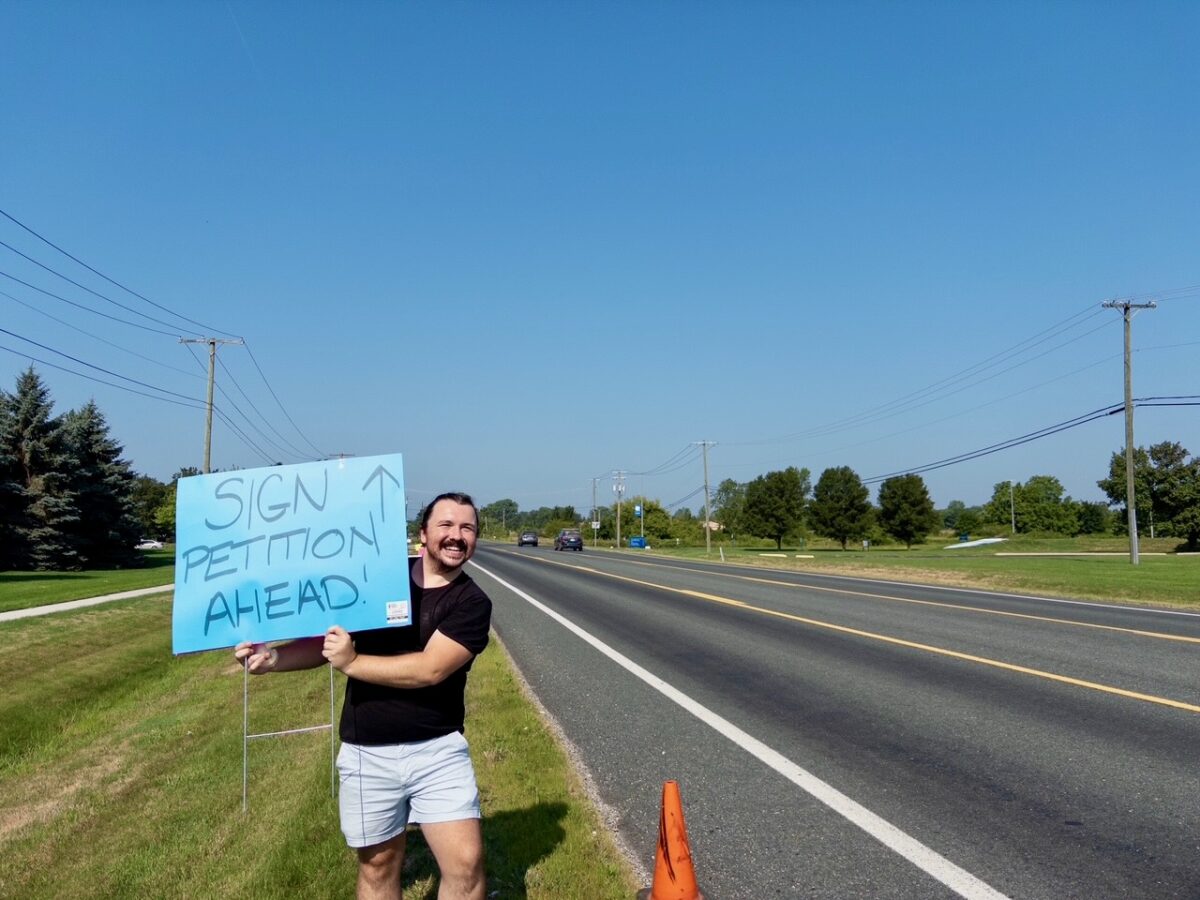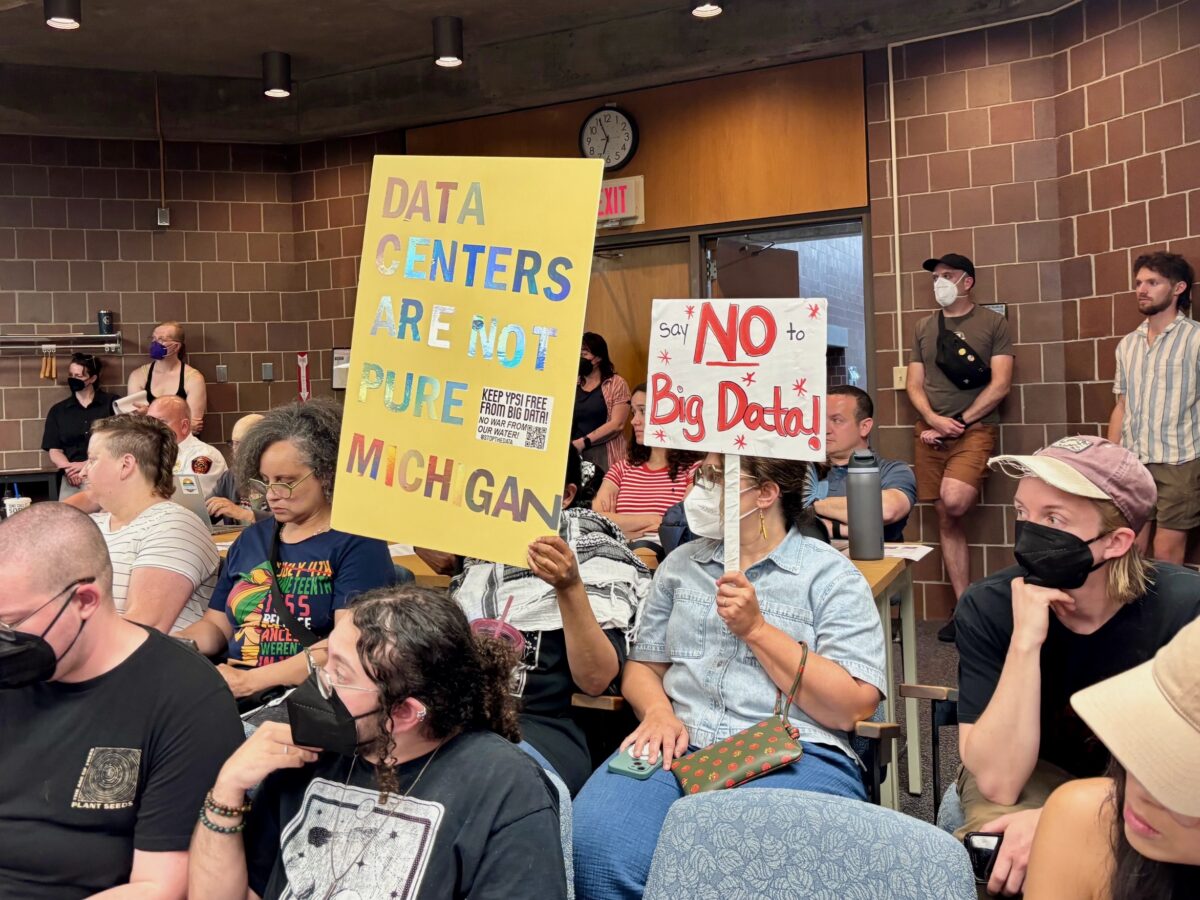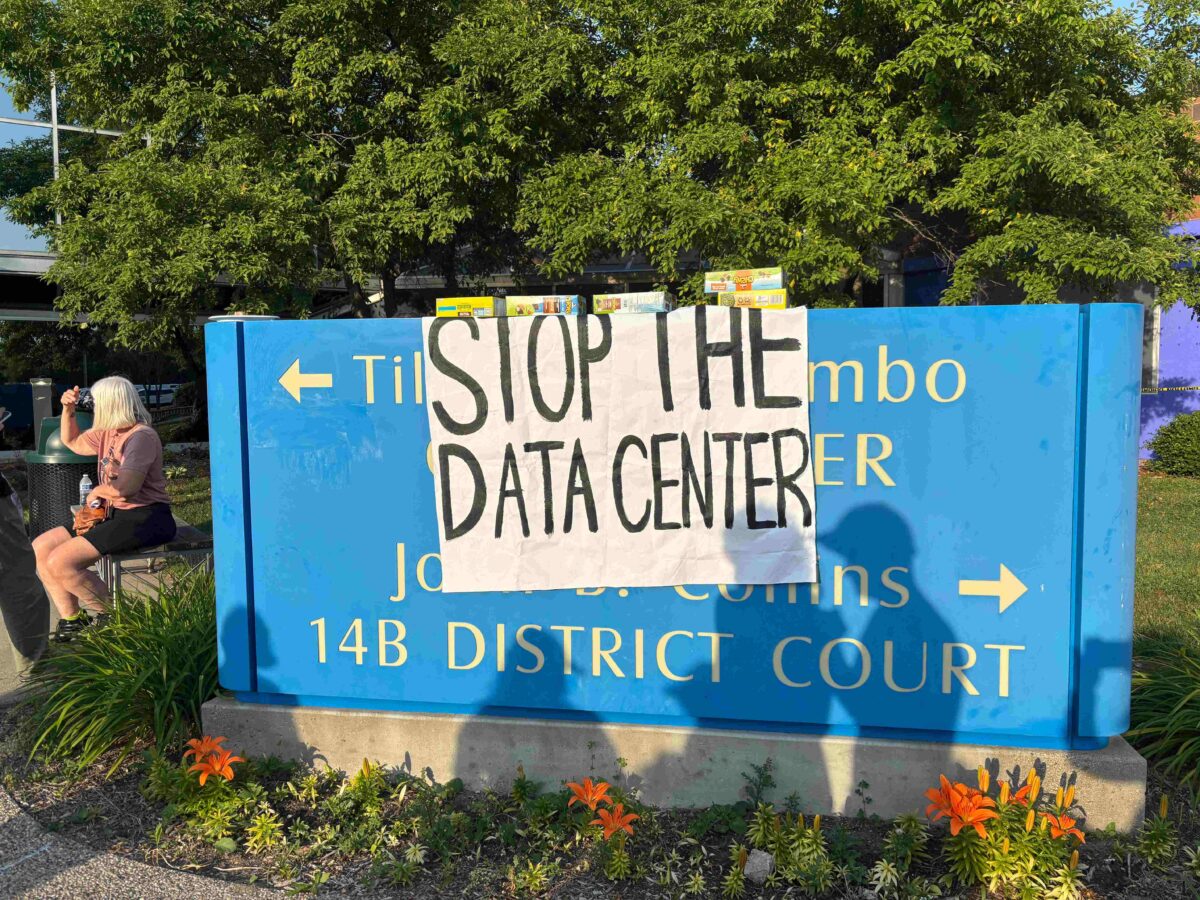Overview:
-The Augusta Township board voted in July to rezone 522 acres for a data center development.
-The group Protect Augusta Charter Township is collecting signatures to put the issue before voters in a referendum.
-Township residents told Planet Detroit the development could bring noise and air pollution to the largely rural area
A group opposing a $1 billion data center project in Augusta Charter Township began gathering signatures this month for a ballot initiative.
Township resident David Major was among those who stopped by to sign the ballot petition on Saturday, telling Planet Detroit the project would pressure the grid and local water system.
“I think the data center is going to use too many resources, including water (and) electricity,” he said, adding that this could lead to a spike in utility bills while providing few jobs.
The organizers behind the ballot initiative look to garner enough signatures to have voters decide whether to overturn the township board’s July 22 decision to rezone 522 acres to allow for the data center.
The New York City-based real estate firm Thor Equities is developing the project, which is designed to hold large numbers of computer servers and networking equipment, according to a report from the planning firm Carlisle Wortman Associates. Companies like Amazon, Google, Microsoft, and Meta use such facilities to support digital infrastructure, the report says.
Raj Vohra, executive vice president for Thor Equities, said at a May public hearing the project represents a “well over a $1 billion investment.”
Township residents told Planet Detroit the development could bring noise and air pollution to the largely rural area, and some express concern the power-hungry facility may strain the grid in an area that already deals with frequent blackouts and brownouts.
The group looking to put a question on the board’s rezoning decision on a future ballot will need to collect 561 signatures by Aug. 26, Augusta Township Clerk Kim Gonczy said in an email.
Organizer Travis Matts said the group Protect Augusta Charter Township (PACT) is working to collect over 700 signatures, which would give the group a cushion if some signatures are rejected.
How data centers factor impact Michigan’s energy needs
In 2024, Michigan passed tax breaks for large data center developments that environmental advocates said would trigger an “offramp” in Michigan’s 2023 climate legislation that allows fossil fuel generation to be built or continue running if there isn’t enough capacity to meet demand.
DTE Energy is in talks with large technology companies to supply as much as 7 gigawatts of power for proposed data centers, according to a Reuters report. Yet Inside Climate News reports DTE’s grid capacity is roughly 11 GW, delivering a peak of 9.5 GW to its users, meaning the load growth from data centers could put the utility well over its capacity.
DTE spokesperson Jill Wilmot said in a statement: “DTE Energy is confident that with our diverse generation mix … we can support data center growth and meet the state’s ambitious 2023 clean energy standard.”
However, additional renewable energy and baseload generation could be needed, depending on how many data centers come to the state and their size, Wilmot said. Baseload generation includes fossil fuel and nuclear power plants, which are designed to constantly generate large amounts of power.
Township officials have said that approving the data center will provide millions in tax benefits, and the development will bring municipal water and sewer lines to areas of the township that lack these services.
The Augusta Township data center will have minimal impact on traffic in the area, and power issues will be addressed by transmission lines that are already on the site, according to Thor spokesperson John Sellek.
Sellek said data centers are essential for online services like streaming videos and financial transactions.
Artificial intelligence is the primary driver for data center development, which is expected to grow at a rate of 19% to 22% annually through 2030, according to a 2024 McKinsey and Company analysis.
Energy reliability, noise and air pollution top concerns with data center
Augusta Township resident Wendy Tobler, who is collecting signatures with PACT, said the data center could add to energy reliability problems in the area, where high summertime power demand has already sparked warnings of rolling blackouts.
“More and more of us are getting standby generators because (outages are) so frequent,” she said. “The thought that this will make it many times worse is not pleasant.”
Matts said a large data center could also bring air and noise pollution.
Data centers often have dozens of diesel generators the size of railroad cars onsite to supply around-the-clock power in case of an outage or for maintenance. These generators can emit carbon monoxide and nitrogen oxides, adding to ozone formation.
Township trustees downplayed concerns about noise at the July 22 meeting. Trustee Keith Gipfert said he took a sound level reading 1,200 feet from a data center in New Albany, Ohio that registered at 61 decibels. This is slightly louder than a household refrigerator, according to a Yale University decibel comparison chart.
Backup generators can emit noise as loud as 110 dB in nearby areas, the trade publication Data Center Knowledge reports. This is comparable to the noise produced by a chain saw.
Data centers can also increase energy prices for residential utility customers, according to a July report from the University of Michigan’s Ford School of Public Policy. The facilities can drive up overall energy demand, leading to price hikes, and potentially pass on the costs of infrastructure upgrades needed for development, the study finds.
Some large data centers require more energy than cities as large as Pittsburgh, and specialized rates for the facilities can leave other customers paying more. Michigan utilities may set special rates for large customers, and these require approval by the Michigan Public Service Commission, said MPSC spokesperson Matt Helms.
Monitoring Analytics, which is the independent watchdog for mid-Atlantic grid operator PJM Interconnection, found that 70%, or $9.3 billion, of last year’s electricity price increase was due to data center demand.
Residents have also raised concerns that the project could impact their water service. Data centers can use significant quantities of water to cool servers, and MLive reports the Augusta data center would use 1 million gallons of water a day.
Trustees said at the July meeting that the facility would be running a new water main and its operation would not affect other users.
MORE PLANET DETROIT REPORTING
University of Michigan’s ‘big bad data center’ faces opposition from top Ypsilanti Township official
Supervisor Brenda Stumbo says University of Michigan misled her about the size of the project and voiced concerns about noise, vibration, and possible environmental impacts.
Ypsilanti Township residents speak out against University of Michigan’s ‘biggest, baddest’ data center
In Ypsilanti Township, residents are sounding alarms over a $1.2 billion data center project by the University of Michigan and Los Alamos National Laboratory, citing fears of rising utility costs, environmental harm, and the advancement of surveillance technologies.
What does AI mean for Michigan’s environment?
Michigan’s tax breaks for data centers may raise energy costs, increase water usage and jeopardize the state’s climate plan as AI technology advances.
Who wants their taxes to go up?
The Augusta Township board unanimously voted to approve the rezoning for the data center site in July, despite the township’s planning commission voting 5-1 to recommend denial in May.
Clerk Gonczy said the possibility of bringing water service to the west side of the township is especially important. Several homes in the area that must haul water in, or have it delivered, she said.
Gonczy said she couldn’t give a precise estimate of tax revenue from the project, but said it should be “in the millions” annually. This would be split between the township, county, and schools, she said.
Augusta Township Supervisor Todd Waller said at the July 22 meeting that, “We can raise the taxes, or we can allow something to help alleviate the pressures of these costs.”
Waller asked for a show of hands of how many wanted their taxes to go up, and roughly half the crowd seen in the meeting video did so.
“I’ll have mine go up if it means no data center,” one attendee shouted.
The Associated Press contributed to this story.





